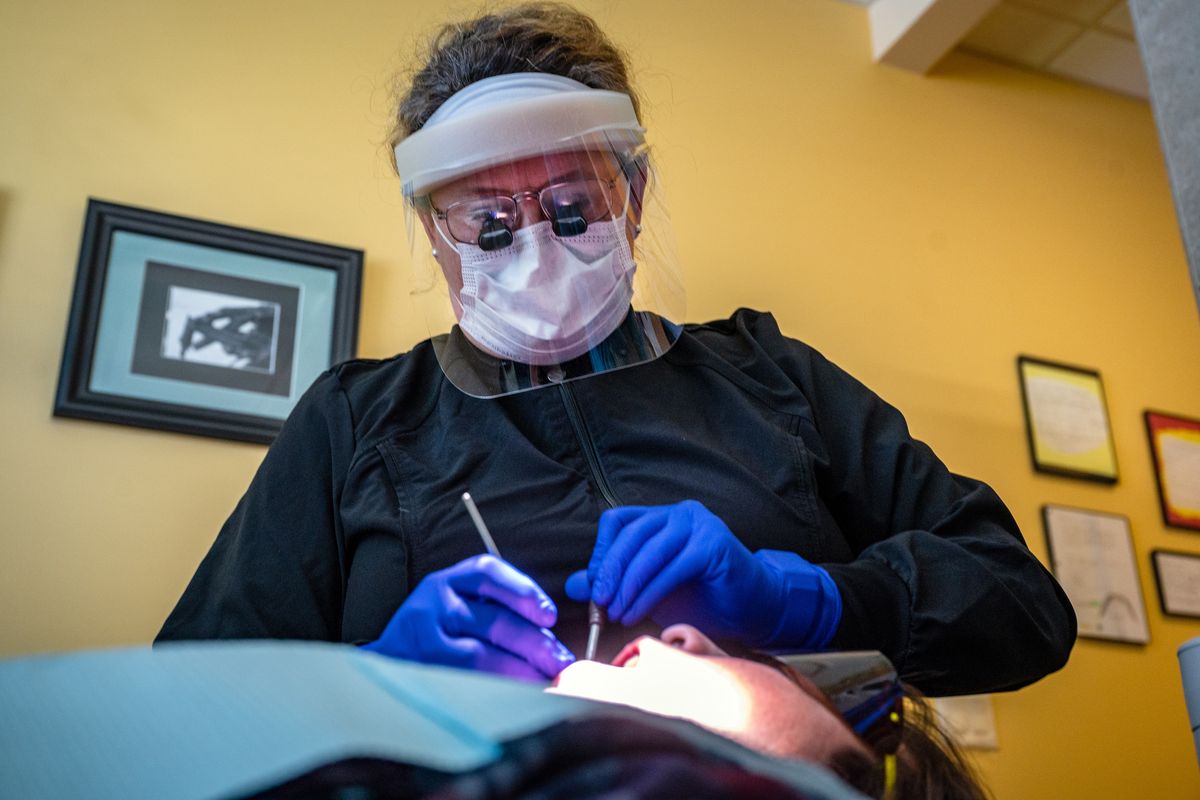Clamping down on teeth grinding: This year’s stressors are putting a dent in oral health

Your body responds to stress, whether it’s a faster heart rate or tight muscles. If you’re feeling extra strains because of COVID-19 pandemic issues and world events, another physical response can go directly to the mouth and put a dent in the health of your teeth and gums.
Do you wake up with jaw pain and tenderness? It might be because you’re grinding your teeth more at night or even unconsciously during the day. Are you clenching your teeth as you work?
Other stress-related oral health issues can range from gum disease to canker sores. Your dentist can help you with prevention tips and self-care for any of these issues, said Dr. Kyle Dosch, Spokane-based dental director at Delta Dental of Washington.
“Stress is something that can always manifest itself in our physical health, including our oral health,” Dosch said.
“Now with COVID, it’s an even more stressful time for many people both personally and professionally, so some of the same conditions that have always been present in our oral health through stresses in our daily life can be even more frequently occurring now.”
With current events and related pressures, these oral health issues likely are happening to some people for the first time, he said, such as teeth grinding.
For stress-related problems with teeth and gums, there are certain strategies to keep in mind:
Teeth grinding or clenching
Know that stress and anxiety are two of the most common reasons why people grind their teeth during the day and while asleep. It can ruin your teeth. Symptoms include jaw pain, stiff neck, temporal headaches, chips or cracks in teeth, gum and enamel erosions and increased tooth sensitivity. Consider internal and external stresses first.
“Are you drinking more caffeine than you typically would?” Dosch asked. “Are you drinking more alcohol than you had before? Or is it an external stress, like your children have gone back to school, but there’s now a case of COVID at school, or if they’re doing distance learning, have you taken on the added responsibility of working yourself remotely but also helping educate your children?”
“See if it’s something you can adjust or remove if you notice you’re clenching or grinding your teeth. If it’s something that’s gotten to the point you’ve started to notice the oral effects, like maybe you’ve broken a tooth recently or noticed gum recession or some sensitivity that’s not able to be treated by sensitivity toothpaste, that’s when you need to be seeing your dentist to talk about what’s going on.”
A dentist likely will recommend a night guard to prevent further damage, he said.
Gum disease
Preventative steps against gum disease still require good dental hygiene – from regularly brushing your teeth to flossing and healthy diet. However, stress is sneaky in this category as far as the body’s ability to defend itself against infections, including infections of your gums.
“Gum disease is a bacterial process,” Dosch said. “Certain bacteria when they get below our gum line, that can create localized infection there. That affects the gum and bone tissue and can lead to bleeding gums and loss of bone.”
Dental practices address those issues by removing plaque and tartar, which is plaque buildup that hardens or calcifies on the teeth. More plaque can mean more cavities and even periodontal disease. If you notice any changes to your gum tissues, consider seeing a dentist to get ahead of any problems.
“When we’re stressed out, it can be harder for our body to fight any type of infection, and that includes periodontal disease,” Dosch said. But this issue also has a second aspect, he added.
“The second way is related back to teeth grinding. When we are grinding our teeth together and creating additional stress, that can damage the supporting tissues, the bone that’s supporting our teeth, and that added stress on those tissues that support the teeth can accelerate that process of gum disease and can actually contribute to additional loss of bone.”
Canker sores
Quite painful, these sores can appear as having a white or grayish base and red borders in your mouth. Dental experts and physicians aren’t sure what causes them, but they’re often tied to problems with the immune system, minor trauma such as biting inside your cheek or as your body fights infections.
If they show up, avoid hot, spicy and acidic foods to let the sores heal over about a week. If they appear often and in large numbers, your dentist might be able to prescribe ointments to ease pain and speed up healing. Dosch said stress is one of the problems thought to be behind canker sores.
“There are certain events that tend to trigger the development of these in the mouth, and one of them is stress,” he said. “When you’re undergoing stress, it can create whatever the physiologic process is, whether it’s tied to the immune system, which can create small ulcerations in your mouth, which we call canker sores.”
He also cited the sores might be related to accidental biting inside the mouth or on lips, or for some people, eating spicy foods can create a minor trauma in the mouth, similar to a tiny burn, that might develop into a canker sore.
“Some people when they get various infections with a bacteria or virus, they tend to get canker sores, so it’s usually something that’s going on in the body that has disrupted the body in some way, whether it’s trauma, stress or certain stimuli that can cause a canker sore to develop in the mouth.”
Overall, Dosch suggests other common strategies to decrease stress: using relaxation techniques, getting plenty of sleep, staying hydrated, spending time outdoors, exercising and eating healthy foods.